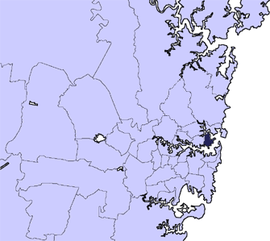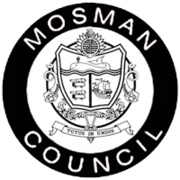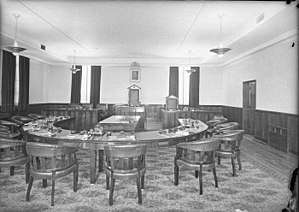Mosman Council
| Mosman Council New South Wales | |||||||||||||||
|---|---|---|---|---|---|---|---|---|---|---|---|---|---|---|---|
 Location in metropolitan Sydney | |||||||||||||||
| Coordinates | 33°50′S 151°15′E / 33.833°S 151.250°ECoordinates: 33°50′S 151°15′E / 33.833°S 151.250°E | ||||||||||||||
| Population | 28,475 (2016 census)[1] | ||||||||||||||
| • Density | 3,160/km2 (8,200/sq mi) | ||||||||||||||
| Established |
11 April 1893 (as Borough of Mosman) | ||||||||||||||
| Area | 9 km2 (3.5 sq mi) | ||||||||||||||
| Mayor | Carolyn Corrigan (Serving Mosman) | ||||||||||||||
| Council seat | Mosman | ||||||||||||||
| Region | Metropolitan Sydney | ||||||||||||||
| State electorate(s) | North Shore | ||||||||||||||
| Federal Division(s) | Warringah | ||||||||||||||
 | |||||||||||||||
| Website | Mosman Council | ||||||||||||||
| |||||||||||||||
The Mosman Council is a local government area on the lower north shore region of Sydney, New South Wales, Australia.
The Mayor of the Mosman Council is Cr. Carolyn Corrigan, a representative of the Serving Mosman independent political group since 9 September 2017.[2]
Suburbs and localities in the local government area
In February 1997, the Government gazetted that they had assigned the suburb of Mosman as the only suburb in the Municipality of Mosman. However, Mosman Council decided that residents should continue to be allowed to use the traditional locality names if they wished.[3]
The municipality also includes, manages and maintains the following localities and locations:
- Athol Bay
- Balmoral
- Balmoral Beach
- Beauty Point
- Bradleys Head
- Chinamans Beach
- Chowder Bay
- Chowder Head
- Clifton Gardens
- Cobblers Beach
- Edwards Beach
- Georges Head
- Georges Heights
- Hunters Bay
- Little Sirius Cove
- Long Bay
- Middle Head
- Mosman Bay
- Obelisk Bay
- Parriwi Head
- Pearl Bay
- Quakers Hat Bay
- Rocky Point
- Shell Cove
- Spit Junction
- Taylors Bay
- Taronga Zoo
- The Spit
- Wyargine Point
Demographics
At the 2016 census, there were 28,475 people in the Mosman local government area, of these 46.3 per cent were male and 53.7 per cent were female. Aboriginal and Torres Strait Islander people made up 0.2 per cent of the population; significantly below the NSW and Australian averages of 2.9 and 2.8 per cent respectively. The median age of people in the Mosman Council area was 42 years; significantly above the national average of 38 years. Children aged 0 – 14 years made up 17.6 per cent of the population and people aged 65 years and over made up 19.1 per cent of the population. Of people in the area aged 15 years and over, 51.8 per cent were married and 10.3 per cent were either divorced or separated.[1]
Population growth in the Mosman local government area between the 2001 census and the 2006 census was 2.99 per cent; and in the subsequent five years to the 2011 census, population growth was 4.64 per cent. At the 2016 census, the population in the Mosman Council area increased by 3.72 per cent. When compared with total population growth of Australia for the same period, being 8.8 per cent, population growth in the Mosman local government area was lower than the national average.[1][4][5] The median weekly income for residents within the Mosman Council area was significantly higher and nearly double the national average.
Slightly below 50 per cent of residents in the Mosman Council area nominated an affiliation with Christianity at the 2016 census, compared with the national average of 52.1 per cent. The proportion of residents with no religion was on par with the national average. Compared to the national average, at the 2016 census, households in the Mosman local government area had a low proportion (18.6 per cent) where two or more languages are spoken (national average was 22.2 per cent); and a high proportion (77.9 per cent) where English only was spoken at home (national average was 72.7 per cent).[1]
| Selected historical census data for Mosman local government area | ||||||
|---|---|---|---|---|---|---|
| Census year | 2001[6] | 2006[4] | 2011[5] | 2016[1] | ||
| Population | Estimated residents on census night | 25,475 | 26,236 | 27,453 | 28,475 | |
| LGA rank in terms of size within New South Wales | 70th | |||||
| % of New South Wales population | 0.42% | |||||
| % of Australian population | 0.14% | |||||
| Estimated ATSI population on census night | 21 | 26 | 31 | 60 | ||
| % of ATSI population to residents | 0.1% | |||||
| Cultural and language diversity | ||||||
| Ancestry, top responses | English | 29.0% | ||||
| Australian | 20.6% | |||||
| Irish | 9.9% | |||||
| Scottish | 8.3% | |||||
| Chinese | n/c | n/c | n/c | |||
| Language, top responses (other than English) | Mandarin | n/c | n/c | |||
| Spanish | n/c | n/c | n/c | |||
| French | 0.7% | |||||
| Cantonese | 1.0% | |||||
| Italian | 0.8% | |||||
| Religious affiliation | ||||||
| Religious affiliation, top responses | No religion, so described | 17.1% | ||||
| Catholic | 25.3% | |||||
| Anglican | 29.6% | |||||
| Not stated | n/c | n/c | n/c | |||
| Presbyterian and Reformed | 4.4% | |||||
| Median weekly incomes | ||||||
| Personal income | Median weekly personal income | A$969 | A$1,117 | A$1,295 | ||
| % of Australian median income | 207.9% | |||||
| Family income | Median weekly family income | A$1,916 | A$2,838 | A$3,671 | ||
| % of Australian median income | 186.6% | |||||
| Household income | Median weekly household income | A$2,675 | A$2,465 | A$2,522 | ||
| % of Australian median income | 228.4% | |||||
| Dwelling structure | ||||||
| Dwelling type | Separate house | 36.9% | ||||
| Semi-detached, terrace or townhouse | 12.5% | |||||
| Flat or apartment | 48.6% | |||||
Council
| Mayor | Term | Notes | |
|---|---|---|---|
| Mayor | Carolyn Corrigan | 9 September 2017 – date | Deputy Mayor 2015–2016[7] |
| Deputy Mayor | Roy Bendall | 6 September 2016 – date | [8] |
| General Manager | Term | Notes | |
| Dominic Johnson | 8 August 2016 – present | Acting General Manager of Ryde 2014–2015 | |
Current composition and election method
Mosman Council is composed of seven Councillors, including the Mayor, for a fixed four-year term of office. The Mayor is directly elected while the six other Councillors are elected proportionally as one ward. Prior to the 2012 elections, the area was divided into three wards, each electing three councillors.[9] The most recent election was held on 9 September 2017, and the makeup of the Council, including the Mayor, is as follows:[10][11]
| Party | Councillors | |
|---|---|---|
| Serving Mosman | 3 | |
| Independent | 2 | |
| Residents for Mosman | 2 | |
| Total | 7 | |
The current Council, elected in 2017, in order of election, is:[10]
| Councillor | Party | Notes | |
|---|---|---|---|
| Carolyn Corrigan | Serving Mosman | Deputy Mayor 2015–2016, Mayor 2017–date[11] | |
| Tom Sherlock | Serving Mosman | ||
| Roy Bendall | Residents for Mosman | Deputy Mayor 2012–2015, 2016–date | |
| Simon Menzies | Independent | ||
| David Cook | Serving Mosman | ||
| Libby Moline | Independent | ||
| Jacqui Willoughby | Residents for Mosman | ||
History

Mosman was first incorporated in 1867 as the "Mossmans Ward" of the Municipality of St Leonards, which lasted until 1890 when the municipalities of Victoria, St Leonards and East St Leonards merged to form the Municipality of North Sydney, with the Mosman ward renamed as the "Mossman Ward". Following a petition submitted by residents in 1892, on 11 April 1893 the ward's separation as the Borough of Mosman was proclaimed by Lieutenant-Governor Sir Frederick Darley.[12] The first nine-member council was elected on 9 June 1893, with the first mayor, Richard Hayes Harnett Jr., elected on the same day.[13] From 28 December 1906, following the passing of the Local Government Act, 1906, the council was renamed as the "Municipality of Mosman". With the passing of the Local Government Act, 1993, the Municipality of Mosman was legally renamed as Mosman Council and aldermen were renamed councillors.
A 2015 review of local government boundaries by the NSW Government Independent Pricing and Regulatory Tribunal recommended that the Municipality of Mosman merge with adjoining councils. The government considered two proposals. The first proposed a merger of Manly and Mosman Councils and parts of Warringah Council to form a new council with an area of 49 square kilometres (19 sq mi) and support a population of approximately 153,000.[14] The alternative, proposed by Warringah Council on 23 February 2016, was for an amalgamation of the Pittwater, Manly and Warringah councils. As a consequence of Warringah's proposal, the New South Wales Minister for Local Government Paul Toole proposed that the North Sydney, Willoughby and Mosman Council be merged.[15] In July 2017, the Berejiklian government decided to abandon the forced merger of the North Sydney, Willoughby and Mosman local government areas, along with several other proposed forced mergers.[16]
Heritage listings
The Mosman Council has a number of heritage-listed sites, including:
- Balmoral, The Esplanade: Balmoral Bathers Pavilion[17]
- Georges Head, Chowder Bay Road: Georges Head Fortifications[18]
- Middle Head, Middle Head Road: Middle Head Fortifications[19]
- Mosman, Avenue Road: Mosman Bay Sewage Aqueduct[20]
- Mosman, 1 Avenue Road: Monterey[21]
- Mosman, 3a Avenue Road: The Barn, Scout Hall[22]
- Mosman, 114 Belmont Road: Alma House[23]
- Mosman, Bradleys Head Road (within Sydney Harbour NP): Bradleys Head Fortification Complex[24]
- Mosman, 34 Bullecourt Avenue: Woolley House[25]
- Mosman, 42 Cowles Road: 42 Cowles Road, Mosman[26]
- Mosman, 624-632 Military Road: Boronia House[27]
- Mosman, 28 Mistral Avenue: 28 Mistral Avenue, Mosman[28]
- Mosman, 65 Parriwi Road: Igloo House[29]
- Port Jackson, Bradleys Head: Bradleys Head Light[30]
Sister city
Mosman has twin town status with Glen Innes.
See also
References
- 1 2 3 4 5 Australian Bureau of Statistics (27 June 2017). "Mosman (A)". 2016 Census QuickStats. Retrieved 5 July 2017.

- ↑ Tang, Caroline (11 September 2017). "CAROLYN CORRIGAN TO BECOME NEW MOSMAN MAYOR". Mosman Daily. Retrieved 22 September 2017.
- ↑ "Ordinary Meeting Agenda" (PDF). Mosman Municipal Council. 29 November 2005. p. 83.
- 1 2 Australian Bureau of Statistics (25 October 2007). "Mosman (A)". 2006 Census QuickStats. Retrieved 5 November 2012.
- 1 2 Australian Bureau of Statistics (31 October 2012). "Mosman (A)". 2011 Census QuickStats. Retrieved 5 November 2012.

- ↑ Australian Bureau of Statistics (9 March 2006). "Mosman (A)". 2001 Census QuickStats. Retrieved 5 November 2012.
- ↑ Hevesi, Bryant (18 September 2015). "Carolyn Corrigan wins Mosman deputy mayor vote after Roy Bendall stands down from position". Mosman Daily. Retrieved 12 October 2017.
- ↑ Tang, Caroline (15 September 2016). "Roy Bendall elected Mosman deputy mayor for fourth time, says he will fight to maintain suburb's independence". Mosman Daily. Retrieved 12 October 2017.
- ↑ "Mosman Municipal Council". 2008 Election results. Electoral Commission of New South Wales. Retrieved 17 September 2012.
- 1 2 "Mosman – Councillor Contest". NSW Local Council Elections 2017. NSW Electoral Commission. Retrieved 22 September 2017.
- 1 2 "Mosman – Mayoral Contest". NSW Local Council Elections 2017. NSW Electoral Commission. Retrieved 22 September 2017.
- ↑ "Government Gazette Proclamations and Legislation". New South Wales Government Gazette (234). 11 April 1893. p. 2835. Retrieved 4 March 2017 – via National Library of Australia.
- ↑ "BOROUGH OF MOSMAN". New South Wales Government Gazette (434). 16 June 1893. p. 4759. Retrieved 4 March 2017 – via National Library of Australia.
- ↑ "Merger proposal: Manly Council, Mosman Municipal Council, Warringah Council (part)" (PDF). Government of New South Wales. January 2016. p. 8. Retrieved 27 February 2016.
- ↑ Toole, Paul (25 February 2016). "North Sydney, Willoughby and Mosman councils Proposal" (PDF). Government of New South Wales. Retrieved 27 February 2016.
- ↑ Blumer, Clare; Chettle, Nicole (27 July 2017). "NSW council amalgamations: Mayors fight to claw back court dollars after backflip on merger". ABC News. Australia. Retrieved 27 July 2017.
- ↑ "Balmoral Bathers Pavilion, New South Wales State Heritage Register (NSW SHR) Number H00760". New South Wales State Heritage Register. Office of Environment and Heritage. Retrieved 18 May 2018.
- ↑ "Georges Head Military Fortifications, New South Wales State Heritage Register (NSW SHR) Number H00987". New South Wales State Heritage Register. Office of Environment and Heritage. Retrieved 18 May 2018.
- ↑ "Middle Head Military Fortifications, New South Wales State Heritage Register (NSW SHR) Number H00999". New South Wales State Heritage Register. Office of Environment and Heritage. Retrieved 18 May 2018.
- ↑ "Mosman Bay Sewage Aqueduct, New South Wales State Heritage Register (NSW SHR) Number H01328". New South Wales State Heritage Register. Office of Environment and Heritage. Retrieved 18 May 2018.
- ↑ "Monterey, residential apartments, New South Wales State Heritage Register (NSW SHR) Number H00367". New South Wales State Heritage Register. Office of Environment and Heritage. Retrieved 18 May 2018.
- ↑ "The Barn - Scout Hall, New South Wales State Heritage Register (NSW SHR) Number H00188". New South Wales State Heritage Register. Office of Environment and Heritage. Retrieved 18 May 2018.
- ↑ "Alma House, New South Wales State Heritage Register (NSW SHR) Number H00070". New South Wales State Heritage Register. Office of Environment and Heritage. Retrieved 18 May 2018.
- ↑ "Bradleys Head Forts and HMAS Sydney 1 Mast and Associated Memorials, New South Wales State Heritage Register (NSW SHR) Number H01838". New South Wales State Heritage Register. Office of Environment and Heritage. Retrieved 18 May 2018.
- ↑ "Woolley House, New South Wales State Heritage Register (NSW SHR) Number H01514". New South Wales State Heritage Register. Office of Environment and Heritage. Retrieved 18 May 2018.
- ↑ "Building, New South Wales State Heritage Register (NSW SHR) Number H00430". New South Wales State Heritage Register. Office of Environment and Heritage. Retrieved 18 May 2018.
- ↑ "Boronia, New South Wales State Heritage Register (NSW SHR) Number H00069". New South Wales State Heritage Register. Office of Environment and Heritage. Retrieved 18 May 2018.
- ↑ "Residence, New South Wales State Heritage Register (NSW SHR) Number H00210". New South Wales State Heritage Register. Office of Environment and Heritage. Retrieved 18 May 2018.
- ↑ "Igloo House, The, New South Wales State Heritage Register (NSW SHR) Number H01652". New South Wales State Heritage Register. Office of Environment and Heritage. Retrieved 18 May 2018.
- ↑ "Bradleys Head Light Tower, New South Wales State Heritage Register (NSW SHR) Number H01430". New South Wales State Heritage Register. Office of Environment and Heritage. Retrieved 18 May 2018.